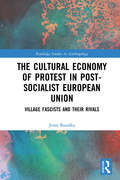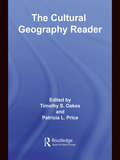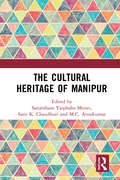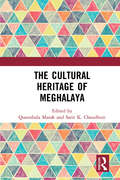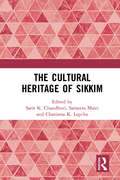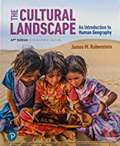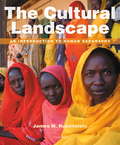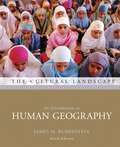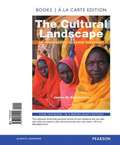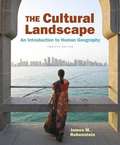- Table View
- List View
The Cultural Dimension of Global Business
by Gary P. Ferraro Elizabeth K. BriodyNow in its ninth edition, The Cultural Dimension of Global Business continues to provide an essential foundation for understanding the impact of culture on global business and global business on culture. The highly experienced authors demonstrate how the theory and insights of cultural anthropology can positively influence the conduct of global business, examining a range of issues that individuals, teams, and organizations face as they work globally and across cultures. The cross-cultural scenarios presented at the end of each chapter allow students of business, management, and anthropology alike to explore cultural differences while gaining valuable practice in thinking through a variety of complex and thorny cultural issues. The fully updated ninth edition offers:• An expanded focus on international perspectives, and greater insight into China and its emergence as a global economic power • Consideration of team interactions in complex global environments, including virtually, while recognizing that individuals have critical influence on business processes and outcomes • New methodological tools with reflections and exercises to inspire readers to begin thinking and acting globally, offering guidance on identifying salient features of an international business or partnership, adjusting to novel or unexpected circumstances, and capturing the perceptions and behaviors of global businesspeople • New chapters on understanding one’s own organizational culture as a precursor to conducting business globally, additional material to enhance business partnership interactions, and strategies for integrating the global into local operations • Discussion of the wide-ranging disruptions facing people and business around the world and the ways in which the global pandemic affected business processes and practices • Further resources via the Instructor & Student Resource, www.routledge.com/cw/ferraro2, including links, blogs, and videos, an instructor’s resource manual, and a section on relevant cultural sources.
The Cultural Dimension of Global Business
by Gary P. Ferraro Elizabeth K. BriodyNow in its ninth edition, The Cultural Dimension of Global Business continues to provide an essential foundation for understanding the impact of culture on global business and global business on culture. The highly experienced authors demonstrate how the theory and insights of cultural anthropology can positively influence the conduct of global business, examining a range of issues that individuals, teams, and organizations face as they work globally and across cultures. The cross-cultural scenarios presented at the end of each chapter allow students of business, management, and anthropology alike to explore cultural differences while gaining valuable practice in thinking through a variety of complex and thorny cultural issues. The fully updated ninth edition offers:• An expanded focus on international perspectives, and greater insight into China and its emergence as a global economic power• Consideration of team interactions in complex global environments, including virtually, while recognizing that individuals have critical influence on business processes and outcomes• New methodological tools with reflections and exercises to inspire readers to begin thinking and acting globally, offering guidance on identifying salient features of an international business or partnership, adjusting to novel or unexpected circumstances, and capturing the perceptions and behaviors of global businesspeople• New chapters on understanding one’s own organizational culture as a precursor to conducting business globally, additional material to enhance business partnership interactions, and strategies for integrating the global into local operations • Discussion of the wide-ranging disruptions facing people and business around the world and the ways in which the global pandemic affected business processes and practices• Further resources via the Instructor & Student Resource, www.routledge.com/cw/ferraro2, including links, blogs, and videos, an instructor’s resource manual, and a section on relevant cultural sources.
The Cultural Dimensions of Sino-Japanese Relations: Essays on the Nineteenth and Twentieth Centuries
by Joshua A. FogelPresents the perceptions that the Chinese and the Japanese have of each other, and the information that helped to fuel those perceptions. There are two sections: China in Japan, debating the Asiatic Mode of Production and kyodotai; and Japan in China, covering the Manchurian Railway.
The Cultural Economy of Protest in Post-Socialist European Union: Village Fascists and their Rivals (Routledge Studies in Anthropology)
by Juraj BuzalkaFocusing on Slovakia and East Central Europe, this book examines the cultural economy of protest and considers how the origins of political movements – progressive and reactionary – derive from resilient agrarian features. It draws attention to how the legacy of rural socialist modernization influences contemporary politics and to the ‘village’ version of fascism developing in the region. The chapters look at the interplay of post-peasant economic and political habits and representations as a result of state-socialism and with regard to the European project, as viewed through an ethnographic lens. Juraj Buzalka describes the bulk of Slovak citizens as post-socialist Europeans with a connection to the countryside who feel that this is where real power in society should be defined and based. He also observes the politicians who are skillfully mobilizing post-peasants while exploiting the political-economic context of the European Union. This volume will be relevant to scholars with an interest in European society and politics, particularly protest and populism, from disciplines including anthropology, sociology, political science and history.
The Cultural Experience: Ethnography In Complex Society
by James Spradley Dianna Shandy David McCurdyThe Cultural Experience has helped generations of undergraduates discover the excitement of ethnographic research through participation in relatively familiar cultures in North American society. Grounded in the interviewing-based ethnographic technique known as ethnosemantics, the latest edition continues to treat ethnography as a discovery process. Students are taught how to set up an ethnographic field study, choose a microculture, and find and approach an informant, as well as how to ask ethnographic questions, record data, and organize and analyze what they have learned. Detailed instruction on how to write an ethnography is also provided. The guidelines are followed by ten short but substantive, well-written student ethnographies on such microcultures as exotic dancing, firefighting, pest extermination, and the work of midwives and police detectives. <p><p> The Second Edition of this popular classroom volume has been expanded to include boxed inserts that offer suggestions to aid in the research process, new material on how to use observation and narratives with the ethnosemantic approach, greater emphasis on how to find cultural themes and adaptive challenges by analyzing ethnographic field data, and more extensive strategies for writing the final ethnographic paper. The latest edition also presents an expanded treatment of ethical responsibilities as well as a discussion of the significance of ethnographic research and its applications in the workplace.
The Cultural Geography Reader
by Patricia L. Price Timothy OakesThe Cultural Geography Reader draws together fifty-two classic and contemporary abridged readings that represent the scope of the discipline and its key concepts. Readings have been selected based on their originality, accessibility and empirical focus, allowing students to grasp the conceptual and theoretical tools of cultural geography through the grounded research of leading scholars in the field. Each of the eight sections begins with an introduction that discusses the key concepts, its history and relation to cultural geography and connections to other disciplines and practices. Six to seven abridged book chapters and journal articles, each with their own focused introductions, are also included in each section. The readability, broad scope, and coverage of both classic and contemporary pieces from the US and UK makes The Cultural Geography Reader relevant and accessible for a broad audience of undergraduate students and graduate students alike. It bridges the different national traditions in the US and UK, as well as introducing the span of classic and contemporary cultural geography. In doing so, it provides the instructor and student with a versatile yet enduring benchmark text.
The Cultural Heritage of Manipur
by S. Yaiphaba MeiteiThe Indira Gandhi Rashtriya Manav Sangrahalaya, Bhopal has a project to map the cultural heritage of North-East India. One volume is planned on each state. Manipur is one of the unique multi-ethnic states of North-East India which has a complex but distinctive cultural heritage of its own. This book presents the different facets of the cultural heritage of the border state of Manipur ingrained within its historicity, identity and political ecology. This book will be of much value for scholars across the disciplinary frames and pave the way for further research. Please note: Taylor & Francis does not sell or distribute the Hardback in India, Pakistan, Nepal, Bhutan, Bangladesh and Sri Lanka.
The Cultural Heritage of Meghalaya
by Queenbala Marak Sarit K. ChaudhuriThe state of Meghalaya, formed on 21 January 1972, is a state of fascinating socio-cultural significance. Its heritage can be traced from the prehistoric times of Stone Age up to the present. Though comprising mainly of the matrilineal Khasi, Garo, and Jaintia tribes – the state also houses many other lesser known communities such as the Hajong,Sakachep, Biate, Koch, Dalu, Margnar and the Nepali. All these communities find voice in this volume.This book looks at the state of Meghalaya exhaustively from the perspective of heritage documentation and maintenance. The 38 chapters written by anthropologists and independent researchers, present the rich traditions found in the region. This volume will be of great help to academicians, researchers, students, and laymen interested in a comprehensive study of the region.Please note: This title is co-published with Manohar Publishers, New Delhi. Taylor & Francis does not sell or distribute the Hardback in South Asia.
The Cultural Heritage of Nagaland
by G. Kanato Chophy Sarit K. ChaudhuriThis volume gives an in-depth account of cultural heritage of Nagaland covering important themes like cultural beliefs, traditional knowledge, material culture, and social institutions. Contributors from diverse disciplines and backgrounds have delved into the cultural heritage of the state’s variegated tribes. Nagaland a hilly state in North-East India had been the centre of British colonialism and American Baptist mission. This cultural contact is significantly reflected in the socio-cultural life, and the contributors have shed light on the continuities and changes. This volume highlights the multiplicity of cultural traditions that are specific to various tribes inhabiting sixteen districts of Nagaland, since their experiences of modernity and cultural contact with ‘others’ have been diverse. The contributors have mainly focussed on the cultural heritage of the majority Naga tribes, but other tribes like the Kukis and Kacharis are part and parcel of the cultural melting pot of Nagaland, and this volume in a way underscores the cultural exchange and interactions. Taylor & Francis does not sell or distribute the print version of this book in India, Pakistan, Nepal, Bhutan, Bangladesh and Sri Lanka.
The Cultural Heritage of Sikkim
by Sarit K. Chaudhuri Sameera Maiti Charisma K. LepchaSikkim has been a region of anthropological interest since the 1930s when Geoffrey Gorer and John Morris did their fieldwork among the Lepchas of Dzongu, north Sikkim. While it was mentioned in various writings of travellers and administrators during the British period, there is a dearth of literature even today on the rich heritage of Sikkim. This collection of twenty-five essays presented first at the international conference on Cultural Heritage of Sikkim, organized by the Department of Anthropology, Sikkim University, Gangtok goes a long way in breaching this gap.The book will be of immense interest to scholars and students of Anthropology, Sociology and Cultural Studies and will lead to new research on the people and the places of Sikkim and India’s North-East.Please note: This title is co-published with Manohar Publishers, New Delhi. Taylor & Francis does not sell or distribute the Hardback in India, Pakistan, Nepal, Bhutan, Bangladesh and Sri Lanka
The Cultural Histories of Radio Luxembourg and Europe n°1: Broadcasting Across Europe
by Richard LegayThis book focuses on two commercial radio stations, Radio Luxembourg and Europe n°1, which were popular institutions in Western Europe throughout the Long Sixties, working across media and broadcasting transnationally. It argues that the existence of an overarching ‘dispositif ’ of commercial radio stations enabled them to operate on various dimensions and differentiated them from other broadcasters. The book therefore answers current calls in media history to look beyond national and single-medium borders and contributes to the cultural and media history of Western Europe.
The Cultural History of the Chinese Concepts Fengjian (Key Concepts in Chinese Thought and Culture)
by Tianyu FengThis book interprets the typical Chinese concepts of fengjian (feudalism) and jingji (economy) by reviewing the mistranslation and mismatching of concepts from ancient to modern times and from a Western language to Chinese and exploring Chinese and Western acculturation, which is in line with Mr. Chen Yinque’s theory—”To interpret a Chinese character is to write a history of culture”. In the coordinates of time and space for the transformation of Chinese concepts from ancient to modern times and their translation from Western languages, this book explores the generation and evolution of Chinese concepts; using the semantic window of Chinese characters, the book reviews the historical and cultural connotations of the semantic changes and the history of the long-lasting culture of Chinese characters. This volume moves from reviewing the semantic changes of fengjian and jingji to elaborating concepts of thought; it makes the study of the history of terms and concepts the study of the history of culture and thought; it analyzes words as part of cultural history to welcome the era of cultural and historical research with a focus on words.This book is both scholarly and readable, satisfying both the academic needs of specialized researchers and the cultural curiosity of those with secondary education or above.
The Cultural Industries
by David HesmondhalghAn undisputed classic, the Fourth Edition of this bestselling media studies text offers an unparalleled analysis of the cultural industries. Bringing together a huge range of research, theory and key concepts, David Hesmondhalgh provides an accessible yet critical exploration of cultural production and consumption in the global media landscape. This new edition: Analyses the influence of IT and tech companies like Google, Apple, Amazon and Facebook on the cultural industries. Discusses the impact of digital technologies on industries such as music, TV, newspapers, books and digital games. Explores the effects of digitalisation on culture, discussing critical issues like participation, power, commercialism, surveillance, and labour. Examines the changing conceptions of audiences, and the increasing influence of market research, audience tracking and advertising. As one of the most read, most studied and most cited books in the field, this Fourth Edition is an essential resource for students and researchers of media and communication studies, the cultural and creative industries, cultural studies and the sociology of the media.
The Cultural Industries
by David HesmondhalghAn undisputed classic, the Fourth Edition of this bestselling media studies text offers an unparalleled analysis of the cultural industries. Bringing together a huge range of research, theory and key concepts, David Hesmondhalgh provides an accessible yet critical exploration of cultural production and consumption in the global media landscape. This new edition: Analyses the influence of IT and tech companies like Google, Apple, Amazon and Facebook on the cultural industries. Discusses the impact of digital technologies on industries such as music, TV, newspapers, books and digital games. Explores the effects of digitalisation on culture, discussing critical issues like participation, power, commercialism, surveillance, and labour. Examines the changing conceptions of audiences, and the increasing influence of market research, audience tracking and advertising. As one of the most read, most studied and most cited books in the field, this Fourth Edition is an essential resource for students and researchers of media and communication studies, the cultural and creative industries, cultural studies and the sociology of the media.
The Cultural Industries
by Prof David Hesmondhalgh"At once brilliant and accessible, it is without peer when it comes to detailing the big picture and complex nuances of how cultural industries work. Every student of the media should have this book on their shelf" - Jennifer Holt, University of California "Sometimes provocative, always insightful and refreshingly direct. No-one could study the culture industries without engaging with its vision and argumentation" - Sonia Livingstone, LSE "Comprehensive and critical, authoritative and analytical, this is a wonderful book that will absorb, stimulate and educate students of media and cultural studies for years to come" - Des Freedman, Goldsmiths, University of London "An exceptional achievement - for its scale, for its comprehensiveness, and for the level-headed intelligence that is the hallmark of Hesmondhalgh's writing" - Graeme Turner, University of Queensland Undisputedly a classic, the third edition of this essential media studies text scrutinizes the changes in creative economy and cultural production in the global media. This book gives you: Guided further reading that takes you directly to the must-read research articles and online resources Brand new examples covering social media, digital publishing, reality TV and talent shows Examples spotlighting the emerging markets in China, India, Asia and Africa Analysis of the economic crisis and its impact on media structures and industries Insight into new products and the influence on consumer electronics and IT companies, including Apple, Facebook and Google. As one of the most read, most studied and most cited media studies texts, this new edition is a must for any student of media and communication studies, the creative industries, cultural studies and the sociology of the media.
The Cultural Intermediaries Reader
by Julian Matthews Jennifer Smith Maguire"A rich selection of readings that expose the shadowy underworld of critics, bloggers, tweeters and stylists who have become essential guides to the good life of cultural consumption... a long overdue examination of how cultural intermediaries work, and how their work supports the new capitalist economy." - Sharon Zukin, Brooklyn College and City University "An array of talented contributors, skilfully brought together by the editors, show how the concept of cultural intermediaries can cast light on cultural production, and on media, culture and society." - David Hesmondhalgh, University of Leeds Cultural intermediaries are the taste makers defining what counts as good taste and cool culture in today's marketplace. Working at the intersection of culture and economy, they perform critical operations in the production and promotion of consumption, constructing legitimacy and adding value through the qualification of goods. Too often, these are processes that remain invisible to the consumer's eye and in scholarly debates about creative industries. The Cultural Intermediaries Reader offers the first, comprehensive introduction to this exciting field of research, providing the conceptual and practical tools needed to analyse these market actors. The book: Surveys the theoretical terrain through accessible, in-depth primers to key approaches (Pierre Bourdieu, Michel Callon and the new economic sociology). Equips readers with a practical guide to methodology that highlights the central features and challenges of conducting cultural intermediary research. Challenges stereotypes and narrow views of cultural work through a diverse range of case studies, including creative directors of advertising and branding campaigns, music critics, lifestyle chefs, assistants in book shops and fashion outlets, personal trainers, bartenders and more. Brings the field to life through a wealth of ethnographic data from research in the US, UK and around the world, in original chapters written by some of the leading scholars in the field. Invites readers to engage with proposed new directions for research, and comparative analyses of cultural intermediaries’ historical development, material practices, and cultural and economic impacts. The book will be an essential point of reference for scholars and students in sociology, critical management, cultural studies, and media studies with an interest in cultural economy, creative labour, and the past, present and future intersections between production and consumption.
The Cultural Intermediaries Reader
by Julian Matthews Jennifer Smith Maguire"A rich selection of readings that expose the shadowy underworld of critics, bloggers, tweeters and stylists who have become essential guides to the good life of cultural consumption... a long overdue examination of how cultural intermediaries work, and how their work supports the new capitalist economy." - Sharon Zukin, Brooklyn College and City University "An array of talented contributors, skilfully brought together by the editors, show how the concept of cultural intermediaries can cast light on cultural production, and on media, culture and society." - David Hesmondhalgh, University of Leeds Cultural intermediaries are the taste makers defining what counts as good taste and cool culture in today's marketplace. Working at the intersection of culture and economy, they perform critical operations in the production and promotion of consumption, constructing legitimacy and adding value through the qualification of goods. Too often, these are processes that remain invisible to the consumer's eye and in scholarly debates about creative industries. The Cultural Intermediaries Reader offers the first, comprehensive introduction to this exciting field of research, providing the conceptual and practical tools needed to analyse these market actors. The book: Surveys the theoretical terrain through accessible, in-depth primers to key approaches (Pierre Bourdieu, Michel Callon and the new economic sociology). Equips readers with a practical guide to methodology that highlights the central features and challenges of conducting cultural intermediary research. Challenges stereotypes and narrow views of cultural work through a diverse range of case studies, including creative directors of advertising and branding campaigns, music critics, lifestyle chefs, assistants in book shops and fashion outlets, personal trainers, bartenders and more. Brings the field to life through a wealth of ethnographic data from research in the US, UK and around the world, in original chapters written by some of the leading scholars in the field. Invites readers to engage with proposed new directions for research, and comparative analyses of cultural intermediaries' historical development, material practices, and cultural and economic impacts. The book will be an essential point of reference for scholars and students in sociology, critical management, cultural studies, and media studies with an interest in cultural economy, creative labour, and the past, present and future intersections between production and consumption.
The Cultural Landscape: An Introduction To Human Geography
by James M. RubensteinTrusted for its timeliness, readability, and sound pedagogy,The Cultural Landscape: An Introduction to Human Geographyemphasizes the relevance of geographic concepts to human challenges. The relationship between globalization and diversity is woven throughout; Rubenstein addresses these themes with a clear organization and presentation that engages students and appeals to instructors.
The Cultural Landscape: An Introduction to Human Geography
by James M. RubensteinTrusted for its timeliness and ample learning aids, this best-seller introduces geography as a social science by emphasizing the relevance of geographic concepts to human problems. Another main focus of the book is the relationship between globalization and cultural diversity, which is woven throughout the narrative. Rubenstein addresses these themes with a clear organization and presentation that you'll find both readable and engaging.
The Cultural Landscape: An Introduction to Human Geography
by James RubensteinTrusted for its timeliness, readability, and sound pedagogy, The Cultural Landscape: An Introduction to Human Geography emphasizes the relevance of geographic concepts to human problems. The relationship between globalization and cultural diversity is woven throughout; Rubenstein addresses these themes with a clear organization and presentation that engages students and appeals to instructors. The Eleventh Edition focuses on issues of access and inequality to discuss negative trends (such as the economic downturn, depleting resources, and human-caused climate change) as well as positive steps taken (sustainability, technology, regime change, women’s rights, and more).
The Cultural Landscape: An Introduction to Human Geography (9th edition)
by James M. RubensteinTrusted for its timeliness and readability, this book introduces geography by emphasizing the relevance of geographic concepts to human problems. Two years after Rubenstein's Update Edition was created to encompass the events of September 11, 2001, this revision also begins the careful process of putting those events into perspective. Provides new "Global Forces and Local Impacts" boxes in each chapter that explore in depth an issue related to chapter material, focusing on particular regions of the world. Includes new material on medical geography, terrorism, mineral resources, sustainable development, conservation, and biodiversity. Presents new information on gender differences in development . Expands material on Ethnicity, relating ethnicity problems to political conflict; also incorporates material previously found elsewhere in the book, such as U. S. urban patterns and South Africa's history of apartheid. For anyone interested in learning more about world geography.
The Cultural Landscape: An Introduction to Human Geography (Eleventh Edition)
by James M. RubensteinTrusted for its timeliness, readability, and sound pedagogy, The Cultural Landscape: An Introduction to Human Geography emphasizes the relevance of geographic concepts to human challenges. The relationship between globalization and cultural diversity is woven throughout; Rubenstein addresses these themes with a clear organization and presentation that engages students and appeals to instructors. The Eleventh Edition focuses on issues of access and inequality to discuss negative trends (such as the economic downturn, depleting resources, and human-caused climate change) as well as positive steps taken (sustainability, technology, regime change, women's rights, and more).
The Cultural Landscape: An Introduction to Human Geography (Twelfth Edition)
by James M. RubensteinTrusted for its timeliness, readability, and sound pedagogy, The Cultural Landscape: An Introduction to Human Geography emphasizes the relevance of geographic concepts to human challenges. The relationship between globalization and diversity is woven throughout; Rubenstein addresses these themes with a clear organization and presentation that engages students and appeals to instructors. <p><p> The 12th Edition challenges readers to apply geography tools and techniques to their local environments, bridging the global and the local, and getting students to interact with their local geography. New applied activities and debate features as well as integration of BBC videos into eText 2.0, further strengthens readers’ ties to the geography all around them.
The Cultural Landscapes of Port au Choix
by M. A. RenoufNewfoundland lies at the intersection of arctic and more temperate regions and, commensurate with this geography, populations of two Amerindian and two Paleoeskimo cultural traditions occupied Port au Choix, in northern Newfoundland, Canada, for centuries and millennia. Over the past two decades The Port au Choix Archaeology Project has sought a comparative understanding of how these different cultures, each with their particular origin and historical trajectory, adapted to the changing physical and social environments, impacted their physical surroundings, and created cultural landscapes. This volume brings together the research of Renouf, her colleagues and her students who together employ multiple perspectives and methods to provide a detailed reconstruction and understanding of the long-term history of Port au Choix. Although geographically focussed on a northern coastal area, this volume has wider implications for understanding archaeological landscapes, human-environment interactions and hunter-gatherer societies.
The Cultural Legacy of the Pre-Ashkenazic Jews in Eastern Europe (Taubman Lectures in Jewish Studies #8)
by Moshe TaubeA free ebook version of this title is available through Luminos, University of California Press’s Open Access publishing program. Visit www.luminosoa.org to learn more. This book uncovers cultural traces of the ancient Jewry of Eastern Europe from the 10th to 15th centuries. These traces take the form of translations from Hebrew into East Slavic, ranging from accounts of Old Testament prophets and other historical figures of interest to both Jews and Christians, such as Alexander the Great, to scientific and philosophical texts on everything from astronomy to physiognomy to metaphysics. Moshe Taube’s fine-grained analysis teases out a robust picture of this massive cultural enterprise: the translators, their erudition, their biases, and their collaborative method of translation with neighboring Christians. Summarizing over thirty years of philological and linguistic research, this book offers a substantial original contribution to the cultural history of Jews in Eastern Europe and their interaction with, and influence on, Slavic culture in the Middle Ages and Early Modern period.


